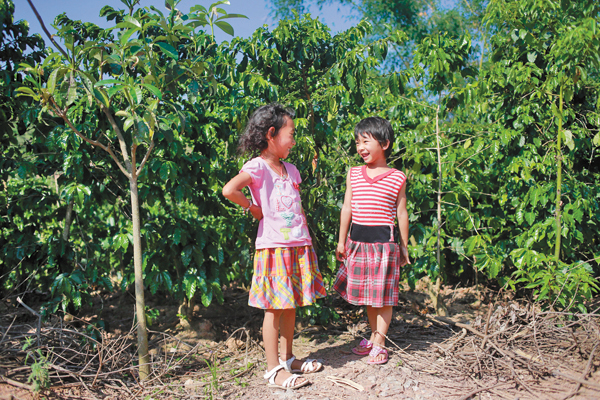
Tea-growing South China may soon gain renown for another beverage, Hu Yongqi reports in Pu'er, Yunnan.
More than 30 years ago, Shi Youfu grew weary of growing rice and corn in his fields.
Although he was a hard worker, the farmer was unable to change his family's fortunes. He resented his low standard of living and the sense of powerlessness he felt knowing that he couldn't afford to send his three children to school.
|
 |
|
Two girls satnd in front of their families' coffee trees in Dakaihe village in Pu'er city, Yunnan province. [Photo / China Daily] |
Then a friend told Shi that he could make more cash by cultivating coffee than by growing traditional crops, and so he became one of the "coffee pioneers" in his home village of Dakaihe in Yunnan province.
Three years later, his trees began bearing coffee "cherries" that ripened to a bright red color. Once the outer layer was stripped - a process known as "hulling" - the beans could be sold for 28 yuan ($4.50) per kilogram, a good price at the time.
Shi recalled his desperate hope that the coffee trees would make a real difference to his lifestyle. His faith bore fruit, and during the next 10 years his family farm began to grow more of the "novelty" plants and fewer traditional crops. Now, he has set aside 4 hectares of land for the cultivation of arabica beans, earning an average net annual income of 90,000 yuan.
"In the first few years, I took it for granted that coffee trees could be nurtured like fruit trees. However, the strict quality control standards meant that the use of pesticides was forbidden and so we had to remove pests by hand," Shi said.
After three decades cultivating coffee trees, this short but stout man has become an expert, vastly knowledgeable about all the procedures required to grow good coffee beans. More than 800 residents in Dakaihe now rely on their coffee plantations, and, along with 140,000 farmers in southern Yunnan's Pu'er city, produced 36,500 metric tons of coffee last year.